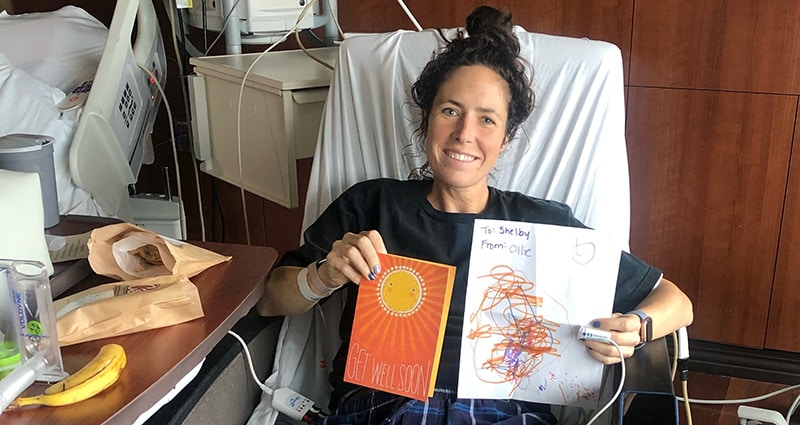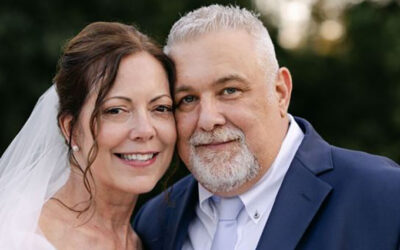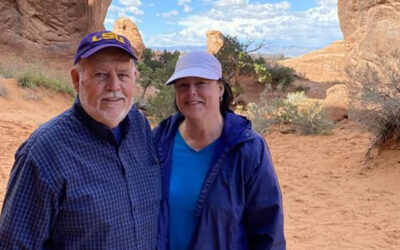Shelby Graciana had spent her whole life as a successful athlete. From the time she was a teen, Graciana was a star on the tennis court, at one point ranking as the top tennis player in Louisiana. More recently, Graciana has worked as a tennis coach in South Louisiana, passing on her talent and love of the game to others.
But all of that came to a screeching halt in early 2023. After days of jaundice that she initially thought was caused by medication, followed by unexplained pain, tests revealed that Graciana had Stage 2 pancreatic cancer.
“The doctors had decided to put a stent in my bile duct because the mass was right up against it,” Graciana said. “They did a biopsy at the same time. After the procedure, I remember being wheeled back to my hospital room. My mom, dad, sister and brother-in-law were standing against the wall, crying, and I didn’t know why. My mom sat on the bed and told me it was cancer. My initial reaction was ‘Wow. Who would have thought?’”
Dr. Mo Al Efishat, a surgical oncologist at Our Lady of the Lake Cancer Institute who was part of Graciana’s care team, said the diagnosis was also surprising to doctors. While studies have shown more young people being diagnosed with other types of cancer, such as colon and breast cancers, the majority of pancreatic cancer cases still occur in people over age 55. Still, Graciana’s story is a lesson to all to be vigilant.
“It’s such a shock to hear that you have cancer, especially when you are a young person. Nobody ever really expects it,” Dr. Al Efishat said. “It can be hard to digest that reality. That’s why it’s become important to me to help patients share their stories. Others can know that they are not alone.”
Cancer-Free After Advanced Treatments
Graciana’s case called for a treatment plan that included robotic Whipple surgery, a procedure that removes part of the pancreas and nearby organs, followed by chemotherapy. For months afterward, Graciana struggled to regain her strength. Between a weakened body and a lack of appetite, her weight dropped dangerously, going as low at 86 pounds. There were moments she even felt close to death. During those times, Graciana thought about the family and friends who were continuing to support her in her journey.
“It got bad for a while,” she said. “But I could physically feel the prayers or good vibes — whatever was being sent my way. It made me want to fight more for the people who were there for me. I wanted to show them that I was appreciative of their support during a time when I didn’t have anything to offer.”
Although all of Graciana’s most recent scans show she is cancer-free, she will continue to have follow-up tests for the next five years. Dr. Al Efishat said such monitoring is standard for most cancer patients. At Our Lady of the Lake Cancer Institute, a multidisciplinary team reviews every cancer patient and discusses all aspects of their care during and after treatment.
“These conferences bring the whole team together — medical oncologists, surgical oncologists, radiation oncologists, radiologists, pathologists, nutrition, clinical trials and support services,” he said. “Our mission is to treat the patient as a whole. We talk about the scans and the tumor, but also who the patient is in terms of their family, support system and lifestyle. We treat the entire person, not just where the cancer is located.”
A Destination for Cancer Care
Dr. Al Efishat added that the collaborative approach means Our Lady of the Lake Cancer Institute clinicians stay up to date on the latest in cancer care, including early detection, improved surgical techniques, immune therapy and more. Through their work, Our Lady of the Lake Cancer Institute has become a regional destination for treatment.
Today, Graciana is working to get back to her previous lifestyle. She is slowly easing her way back into teaching tennis, scheduling a few hours at a time with ample breaks for rest and hydration. Her ultimate goal now is to resume her full schedule based around the sport she has always loved.
“I think the most important thing is to have a care team you trust and people around you who will support you,” she said. “I had three friends who would come over at least once a week. One would come every day just to see how I was doing. It’s so important to have people around who encourage you and also trust in your decisions.”




